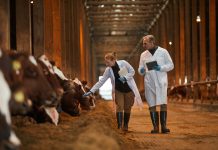Here, Open Access Government discusses how the European Commission is supporting its Member States in creating a sustainable and resilient agricultural sector
The COVID-19 crisis has enormously impacted European agriculture, as it has many other sectors. However, farmers and those employed in the broad agri-food sector have managed to successfully ensure food security throughout this difficult time. To support them, and to also facilitate the movement of agricultural products and seasonal workers throughout the pandemic, the European Commission introduced multiple measures in the last year:
- Introducing Green Lanes, which have allowed for the transport of food and animals, with agricultural workers given priority for crossing the borders.
- Supporting the private storage of beef and cheese.
- Allowing Member States to increase public funding for farmers and agricultural entrepreneurs.
- Introducing a possibility to transfer a proportion of unused rural development funds to assist farmers affected by the impact of the pandemic.
- Continued reform and increased funding for the Common Agricultural Policy (CAP) budget for 2021- 2027.
Common Agricultural Policy (CAP)
The final of these initiatives is particularly notable, as, in May 2020, the Commission proposed to increase the CAP budget by €26 billion, e.g., from €365 billion to €391 billion. At the July summit, €387 billion was finally approved, which exceeds the initial 2018 proposal by €22 billion.
European Commissioner for Agriculture Janusz Wojciejowski commented on this in his speech at the EU Agricultural Outlook Conference in December 2020, saying that the Commission, “appreciates the importance and relevance of agriculture and is aware of how great the needs of the sector are.”
The Commission presented its proposals for the CAP reform in 2018 and since then has made substantial progress, introducing a more flexible, performance and results-based approach that takes into account local conditions and needs. It will modernise and simplify the EU’s policy on agriculture, while hugely taking into consideration Europe’s sustainability targets such as the Green Deal.
The new CAP is built on nine objectives, which are also the basis upon which EU countries design their CAP strategic plans at a national level. EU countries will have greater freedom to shape rules and funding allocations around the needs of their farmers and rural communities, providing they are in line with EU standards and objectives. Countries now submit only one strategic plan addressing their specific needs in the agri-food sector, covering income support, sectoral strategies and rural development, allowing for smoother execution and less of an administrative burden.
More recently, the European Commission published its recommendations for each Member State to assist in the drafting of their Common Agricultural Policy (CAP) strategic plans. These recommendations are part of the dialogue between the Commission and Member States to support them in implementing the CAP from 2023 as well as to ensure that their CAP strategic plans contribute in an ambitious way to the European Green Deal. It is important to align CAP with the Green Deal to support farmers as drivers of the green transition. The new approach combines detailed planning and clear objectives with workable measures and comprehensive monitoring to ensure that results can be achieved.
Commissioner Wojciechowski stated: “The recommendations to Member States are a crucial step in the transition towards increasing the sustainability and resilience of our agricultural sector. I strongly encourage Member States to take these recommendations on board while drafting their CAP strategic plans. By doing this, we can ensure a CAP that is aligned with the Green Deal and that supports farmers as drivers of the green transition. Together with the European Parliament and the Council we will ensure that the CAP reform maintains the necessary environmental and climate ambitions.”
Furthermore, to achieve the 25% organic farming target, the Commission has recommended to a large majority of Member States to develop the necessary food supply chain structures, identify the local potential of organic production, promote the consumption of organic products and ensure support for conversion to and maintenance of organic farming through rural development.
At the beginning of 2021, the Commission published a list of potential eco-schemes that could benefit the future CAP. The list includes organic farming practices, agroecology such as crop rotation, and aims to contribute to the debate around the CAP reform and its role in reaching the Green Deal targets, while also enhancing the transparency of the process for establishing the Strategic CAP Plans, and provides farmers, administrations, scientists and stakeholders a base for further discussion on making the best use of this new instrument.
Once supported by eco-schemes, agricultural practices should consistently:
• Cover activities related to climate, environment, animal welfare and antimicrobial resistance.
• Be defined on the basis of the needs and priorities identified at national/regional levels in their CAP strategic plans.
• Have an above-average ambitious level.
• Contribute to reaching the EU Green Deal targets.
There is also a significant commitment to addressing the EU’s gender gap enshrined in CAP: EU countries are now required to consider the situation for women in rural areas when developing their rural development programmes. This way, more and more women will be encouraged to enter this field.











